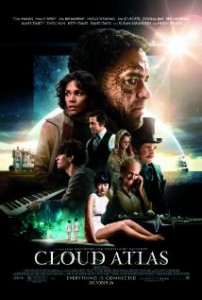 I have mentioned several times on Speculative Fiction Friday that I am very tired of excellent films being ignored due to the amount of speculative fiction elements in them like Big Fish and today’s film, Cloud Atlas. Today, I realized that my mother will never enjoy some of my favorite films because they have been slapped with the sci-fi/fantasy label. However, I think modern audiences have been more open to speculative elements in stories.
I have mentioned several times on Speculative Fiction Friday that I am very tired of excellent films being ignored due to the amount of speculative fiction elements in them like Big Fish and today’s film, Cloud Atlas. Today, I realized that my mother will never enjoy some of my favorite films because they have been slapped with the sci-fi/fantasy label. However, I think modern audiences have been more open to speculative elements in stories.
Cloud Atlas is an anthology film, which means that there is more than one story. These types of films are hit or miss, generally it is because one story is usually admired more than the others. One of my favorite films, Pulp Fiction, is well-done because all three main stories are equally interesting. Cloud Atlas has about six stories, and unlike Quentin Taratino’s classic, these six stories take place in entirely different time periods.
Yes, this makes the film more complicated, but all three of these stories are connected…kind of. There is an 1849 story about a man on a ship who is trying to save a stowaway slave. Then there is a 1936 story about a man who assists a master composer, creating the Cloud Atlas symphony. Then there is a 1973 story about a reporter who is about to break a major story about a nuclear reactor in San Francisco.
Then there is a modern-day story about a publisher who goes into hiding, only to find that he is hiding in a prison. I found this story the least interesting, but because it stars Jim Broadbent, a very entertaining actor, it makes up for it. While I am on the subject of acting, this film has a lot of good ones like Tom Hanks, and he, like the other players, do multiple roles.
Two of these stories take place in the future, and one of them is in 2144, in Neo Seoul,Korea. This is about a clone who starts a revolution, and is easily the bulk of the film’s $100 million budget.
The last story takes place on “The Big Island, 106 winters after The Fall”. This story is about a man who lives in a post-apocalyptic community, and must help out someone in contacting the rest of humanity, who live in space, I guess. I’ll talk more about this after the jump, as there are some limited spoilers.
The film is by the Wachowskis, who gave us The Matrix, one of the my favorite films. In case you are thinking this is might be some big studio’s idea of combining six films into one, this is actually based on a science-fiction novel by David Mitchell, which I haven’t read.
I think that I knew from the get-go that Cloud Atlas would give me as much closure as Inception. Doing an anthology is a challenge, as it requires mixing several stories that usually form a unified point. The aforementioned Pulp Fiction has three very unrelated stories that hardly overlap, but in each of them, a character is given a second chance. I would have to say that individual stories of Cloud Atlas don’t seem to have a unified plotline, and there is only a very faint thread that ties them all together.
In each timeline, a character is somehow inspired by events of the former timeline. I realize that doesn’t make sense, and it isn’t a perfect formula. Just see the movie, and you will see what I mean. I personally think this film is one of the greatest movies of at least last year, and I want to see it again just so I can get everything that I can from this film.
There is one element that is worth taking away from this film and that is “that life is larger than life”. That isn’t a direct quote from the film, but the film shows how one person’s story will influence the generation after them, and it is a good thing. Considering that most of us live life day to day, and plan only for our own life, it is comforting to know that destiny has a plan of its own that is too big for us to understand.
Leave a Reply